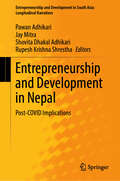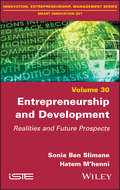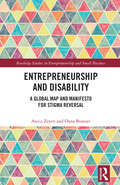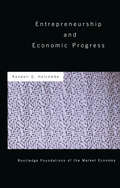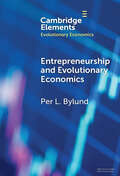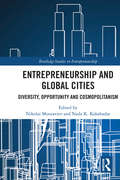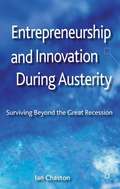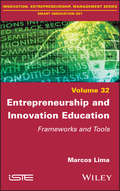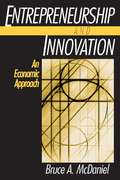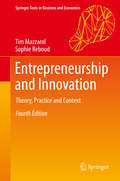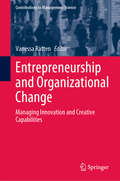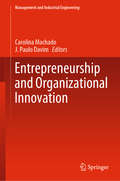- Table View
- List View
Entrepreneurship and Development in Nepal: Post-COVID Implications (Entrepreneurship and Development in South Asia: Longitudinal Narratives)
by Jay Mitra Pawan Adhikari Shovita Dhakal Adhikari Rupesh Krishna ShresthaThis book illustrates a connection between entrepreneurship and development in an emerging economy context, focusing on Nepal. That entrepreneurship contributes to sustainable development by creating jobs, elevating economic growth, promoting innovation, and mitigating social and environmental challenges is discussed in other works. Entrepreneurship is linked to several sustainable development goals. However, relatively little is known about entrepreneurship in Nepal at an international level and rarely have researchers attempted to explore the relationship between entrepreneurship and development in the Nepalese context. In this regard, this book generates valuable insights, not only contributing to policy implications but also setting a direction for entrepreneurship research in Nepal within a wider context of sustainable development. In particular, the book discusses several important issues on entrepreneurship, including migrant entrepreneurship, entrepreneurial ecosystem, social entrepreneurship, entrepreneurial finance, community-based entrepreneurship, and tourism entrepreneurship, issues which are intrinsically connected to the sustainable development of the country. In addition to policy contributions, the book provides a direction for facilitating theoretically underpinned work in entrepreneurship and development in the Nepalese context. The factors driving entrepreneurship, including specific social-cultural and historical factors that remain relevant for emerging economies, and emancipation, inclusion and participation, which are central to achieving development, are to be theorized in order to better understand the relationship between entrepreneurship and development. The topics covered by the book will be of interest to policy-makers from ministries and departments, international organizations, and development partners.
Entrepreneurship and Development: Realities and Future Prospects
by Sonia Ben Slimane Hatem M'henniIn analyzing the complex link between entrepreneurship, innovation and development in the context of the emerging world, this book offers a holistic reading of this triptych based on a theoretical foundation that is itself subject to controversy: the national system of innovative entrepreneurship. The “emerging” nature of the studied countries provides specific insights, and allows the theoretical developments to be fine-tuned to the current issues. In a context that makes competitive advantages transient, emerging markets can provide a real test case for responding in a structural and innovative way to social and economic challenges, thus ensuring the sustainable performance of their innovative entrepreneurial system. Entrepreneurship and Development advocates for the integration of the social and cultural history of a given country within the framework of public policies, and proposes more targeted actions for innovative entrepreneurial activities. Moreover, the education system must integrate the entrepreneurial culture and foster multidisciplinarity to support the transfer of knowledge to markets.
Entrepreneurship and Disability: A Global Map and Manifesto for Stigma Reversal (Routledge Studies in Entrepreneurship and Small Business)
by Oana Branzei Anica ZeyenDiscover how entrepreneurship can dismantle the structural, social, cultural, and internalized stigma of disability in this compelling book. Journey through six countries and uncover inspiring stories of disabled people using diverse entrepreneurial strategies – micro-entrepreneurship, social entrepreneurship, activism, bricolage, compassion, and institutional entrepreneurship – to challenge and overcome stigma.Meet Belen Dofitas, who aids people affected by leprosy in the Philippines through micro-enterprise opportunities. Explore the efforts of Ugandan bricoleurs creating small-scale activities to uplift their communities. Discover the impact of a Kenyan psychiatrist’s peer-to-peer mental health interventions and the Global Minds Collective. Follow six UK women with invisible disabilities as they transform their experiences into powerful advocacy through a documentary. Learn about Neha Arora’s all-disability travel agency, Planet Abled based in India, and her work to allow everyone to read the book that is life. Understand how neurosurgeon Neilank Jha’s work on concussion treatment and brain–computer interfaces is improving lives.These diverse narratives highlight different pathways to systemic change and disability destigmatization. The book concludes by showing how initial slow system changes can accelerate, leading to significant transformations and manifesting declarations that can ultimately change the system. Dive into these stories of entrepreneuring against disability stigma and see how disability entrepreneurship can foster a more inclusive world.
Entrepreneurship and Dynamics in the Knowledge Economy (Routledge Studies in Global Competition)
by Charlie Karlsson Roger R. Stough Börje JohanssonThe phenomenon of entrepreneurship has attracted researchers from a variety of disciplines and a diverse number of analytical approaches. Currently, there is a considerable amount of confusion and a variety of conflicting theories which are being used interchangeably and ambiguously. In this important new book, the authors argue that there are analytically distinct forms of entrepreneurship, each of them having an individual logic of their own. They highlight the role of individual economic agents with endowments of new knowledge or new combinations of old knowledge as entrepreneurs, and thus identify them as dynamic factors in the knowledge economy. Overall, this book not only provides a contemporary overview of current research in the field, but also summarizes the policy conclusions that can be drawn from current research.
Entrepreneurship and Economic Development
by Wim NaudéLeading international scholars provide a timely reconsideration of how and why entrepreneurship matters for economic development, particularly in emerging and developing economies. The book critically dissects the evolving relationship between entrepreneurs and the state.
Entrepreneurship and Economic Development in Hong Kong: The Economic Development Of A Small Open Economy (Routledge Advances In Asia Pacific Business Ser. #No.5)
by Tony Fu-Lai YuThis is the first systematic study of the nature, operation and contribution of entrepreneurship to the growth of Hong Kong. From a new entrepreneurial perspective of economic development, the author argues that the success of Hong Kong is attributable principally to adaptive entrepreneurship: product imitation; small scale enterprise; subcontracti
Entrepreneurship and Economic Progress (Routledge Foundations of the Market Economy)
by Randall HolcombeEntrepreneurship is the engine of economic progress, but mainstream economic models of economic growth tend to leave out the entrepreneurial elements of the economy. This new book from Randall Holcombe begins by identifying areas in which evolutionary and Austrian approaches differ from the academic mainstream literature on economic growth, before moving on to distinguish growth from progress. The author then analyzes economic models of the firm based on the idea that it is entrepreneurship that drives economic progress. The book should prove to be a natural successor to recent Routledge books by Frederic Sautet and David Harper.
Entrepreneurship and Effective Small Business Management
by Norman Scarborough Jeffrey CornwallFor undergraduate and graduate courses in entrepreneurship and/or small business management. Discover how to successfully launch and manage a small business. Open your students’ minds to the possibilities, challenges, and rewards of becoming a small business owner with Entrepreneurship and Effective Small Business Management. This text provides students with the tools they need in order to launch and manage a small business. This Eleventh Edition continues to provide students with a practical, hands-on approach to launch a business that has the greatest chance for success. This edition features ten new cases and the most recent statistics, studies, surveys, and research about entrepreneurship and small business management. This program will provide a better teaching and learning experience―for you and your students. Here’s how: Get Students to Think Critically about Concepts: Cases challenge students to think critically about a variety of topics. Encourage Students to Apply Concepts: Examples and exercises allow students to see how entrepreneurs are putting into practice the concepts that they are learning. Stay on the Cutting-Edge with Today’s Hottest Topics: Every chapter reflects the most recent statistics, studies, surveys, and research about entrepreneurship and small business management.
Entrepreneurship and Evolutionary Economics (Elements in Evolutionary Economics)
by Per L. BylundEntrepreneurship has been expunged from contemporary mainstream economics despite being an important driver and cause of economic development and growth. However, whereas Evolutionary Economics recognizes value-creative entrepreneurship, its role and impact tend to still be understated and the vast implications not fully understood. This Element attempts to remedy this by theorizing on how entrepreneurship impacts and drives market economies, the implications for economic change and renewal, and how the pursuit of new value creation determines the evolution of an economy. We find that allowing for entrepreneurial new value creation – innovative entrepreneurship – produces a different and more dynamic understanding of the market as a process, the role of knowledge and uncertainty, economic evolution and progress, as well as has important implications for political economy.
Entrepreneurship and Family Business Vitality: Surviving and Flourishing in the Long Term (Studies on Entrepreneurship, Structural Change and Industrial Dynamics)
by João Leitão José Manuel Saiz-Álvarez Jesús Manuel Palma-RuizIn order to respond to economic globalization and increased competitive pressures, companies need innovative, efficient and effective management strategies. Accordingly, this book explores various scenarios faced by entrepreneurs and family businesses, and proposes strategies to tackle the challenges and seize opportunities to grow in a highly competitive environment. It underscores the importance of deploying vital strategies to survive and flourish in the long term, overcoming challenges, and capitalizing on opportunities in order to attain / maintain a competitive position. By presenting and integrating the latest insights and case studies on entrepreneurship, family businesses, and strategy research, the book provides concrete recommendations for effective business survival and growth.
Entrepreneurship and Global Cities: Diversity, Opportunity and Cosmopolitanism (Routledge Studies in Entrepreneurship)
by Nikolai Mouraviev Nada K. KakabadseGlobal cities with a largely cosmopolitan environment, such as Auckland, Berlin, Dubai, London, New York, Shanghai or Singapore, are successfully developing and attracting entrepreneurs from all over the world. This book elucidates the policy approaches related to the formation of the cosmopolitan environment that supports entrepreneurship in large urban areas. The book’s core theme is the relationship between cosmopolitanism and entrepreneurship, with the latter viewed as a key driver of economic growth, sustainability and prosperity. The book argues that successful entrepreneurship rests on the two pillars of the cosmopolitan environment: diversity and the creation of business opportunities. In contrast to globalisation’s standardised solutions in policy, commerce, banking and social issues, cosmopolitanism allows individualised value and solutions, whereby actors—entrepreneurs, businesses, families, interest groups, governments, non-governmental organisations and virtual communities—enjoy diversity as a norm. The book pays special attention to under-researched topics, such as threats to sustainability in cosmopolitan cities; why cosmopolitan cities attract immigrants with a highly independent mindset; the impact of religious norms on female and male entrepreneurs; varying experiences of local and expatriate entrepreneurs; and the diff erences in doing business by female entrepreneurs, stemming from their nationalities and residence status. The book off ers conceptual insights into the enablers of entrepreneurship in cosmopolitan cities and urban governance, complemented by case studies based on fi eldwork in Dubai, Hamburg, Istanbul, Karachi, Kyiv, London, Moscow and Tel Aviv. The book will appeal to those who study or teach cosmopolitanism, globalisation or urban development concepts, and those professionals who are considering the possibility of doing business or working as an expatriate in a cosmopolitan city.
Entrepreneurship and Growth
by Gabriel Tortella Gloria QuirogaA collection of eight articles by 17 specialists, this volume provides very recent research on the factors which contribute to the build up of entrepreneurship. Offers an international, comparative and historical perspective, with a special focus upon the Mediterranean.
Entrepreneurship and Innovation During Austerity
by Ian ChastonUses research and real world case materials to examine how market performance can be sustained, even during a period of austerity, by the implementation of innovation-based growth opportunities and the exploitation of technology.
Entrepreneurship and Innovation Education: Frameworks and Tools
by Marcos LimaThis book is a compilation of tools, techniques and frameworks for use in the field of entrepreneurship and innovation (E&I) education. Developed and honed over the past two decades, these teaching approaches are combined with well-versed practical insight. As professors know all too well, the human brain cannot articulate more than three or four dimensions of a problem without the aid of what could be referred to as "checklists for thinking": frameworks (visual or otherwise) that help students think in terms of multiple variables affecting a problem. Entrepreneurship and Innovation Education provides a "toolbox" of more than 50 frameworks for analyzing entrepreneurship and innovation problems, and for enabling effective decision-making. It is a useful guide for professors and students alike who are looking for an overview of available tools, methods and approaches to actively learn how to go from the visionary idea to the market.
Entrepreneurship and Innovation in Automobile Insurance: Samuel P. Black, Jr. and the Rise of Erie Insurance, 1923-1961 (Garland Studies in Entrepreneurship)
by Samuel P. Black John Paul RossiEntrepreneurs play a central role in economic growth and development, but how they do so is the subject of considerable debate. This book explains that process through an historical case study of an automobile insurance entrepreneur, Samuel P. Black, Jr., and Erie Insurance, the company he helped build. It also recounts the largely untold history of American automobile insurance. One of this study's central themes is the role of innovation in the entrepreneurial process. The rise of Erie Insurance from a four-person enterprise in Erie, Pennsylvania, in 1925 to the fourteenth largest property-casualty insurer today was the result, in part, of Black's relentless push to innovate. His continual efforts to cut costs, develop new products, satisfy customers, increase sales, and improve operations, all contributed greatly to the company's growth. A second theme is the automobile's dramatic impact on modern America. Its takeover of mass transportation provided the basis for the development of the automobile insurance industry and created many of the opportunities that Black and Erie Insurance capitalized on. These themes combine in the history of Black and Erie Insurance to illuminate the dynamic process by which the cultural, social, economic, and technological environment creates opportunities that entrepreneurs and entrepreneurial firms exploit, and how entrepreneurial actions stimulate economic growth.
Entrepreneurship and Innovation in Japanese Agriculture (New Frontiers in Regional Science: Asian Perspectives #32)
by Akira KiminamiThis is the first book to comprehensively analyze key issues regarding innovation, entrepreneurship, and human resource development in the Japanese agricultural sector. Despite the fact that innovation and entrepreneurship are vital to the development of modern Japanese agriculture, there have been comparatively few studies in this field; in addition, they have been virtually none on measures for developing entrepreneurial human resources or innovation in agriculture.The agricultural sector’s declining competitiveness and sustainability as an industry in Japan are serious concerns, especially in combination with an aging labor force and decreasing farmland. To date, Japanese agricultural policies have largely concentrated on accumulating farmland and securing a sufficient agricultural labor force. However, from the perspectives of industrial and regional development, policies focusing on creating innovation, the driving force of economic development, have been recognized as being more effective. Moreover, there have been some recent developments concerning innovation and entrepreneurship in various regions of Japan.This book provides a wealth of significant findings from studies on successful cases involving e.g. agricultural clusters, agriculture–commerce–industry collaborations, networking, franchising, and corporate entry-induced innovation utilizing limited regional resources; and how they have contributed to the development of each region. The interrelationships between innovation, entrepreneurship, and human resource development are then clarified, and effective policies to promote Japanese agriculture and rural areas are suggested. Given its scope, the book contributes to the advancement not only of farm management science, but also of regional science and related fields.
Entrepreneurship and Innovation in Sport and Leisure
by Simon Mosey Richard Shipway Chris SymonsThis innovative textbook explains how sport and leisure organisations can become more entrepreneurial in order to achieve sustainable growth. It introduces key tools, techniques, and approaches that can help sport and leisure organisations put entrepreneurship at the centre of their culture. Drawing on cutting-edge research, innovation discourses, and perspectives from multiple disciplines, the book introduces fundamental concepts in entrepreneurship, innovation, and enterprise, such as digitalisation, research and development (R&D), diversification, extendibility, and sustainability. It highlights future innovation challenges, provides innovative solutions, and introduces a new diagnostic tool for managing entrepreneurship and innovation. The book presents insights on everyday management challenges from experienced industry practitioners and considers the importance of social enterprise and social entrepreneurship at a time of austerity, recession, and increasing uncertainty. Full of real-world cases and scenarios, as well as useful features to encourage critical reflection, this book is essential reading for any course on entrepreneurship taken as part of a degree course in sport management leisure, sports studies, recreation, event studies, entertainment management or tourism. It is also fascinating reading for practitioners looking to improve their professional skills.
Entrepreneurship and Innovation: An Economic Approach
by Bruce A. McDanielThis is a groundbreaking economic analysis of entrepreneurship and the development process for innovation. The author strives to distinguish the role of the capitalist from that of an entrepreneur, and to show how the actions of the entrepreneur impact new employment, economic growth, and advancements in the overall standard of living. The book provides in-depth discussion of several critical concepts: the economic development of a product; Schumpeter's "temporary monopoly control;" the economic bounds of product and process innovations; and changing production functions. It also develops and integrates an analysis of how innovation-induced modifications in either products or processes affect both short-run and long-run average costs in production. As a special feature, each chapter includes an interview with a successful entrepreneur. Suggested readings are also provided.
Entrepreneurship and Innovation: Theory, Practice and Context (Springer Texts in Business and Economics)
by Tim Mazzarol Sophie ReboudThis book provides an overview of the theory, practice and context of entrepreneurship and innovation at both the industry and firm level. It provides a foundation of ideas and understandings designed to shape the reader’s thinking and behaviour to better appreciate the role of innovation and entrepreneurship in modern economies, and to recognise their own abilities in this regard. The book is aimed at students studying advanced levels of entrepreneurship, innovation and related fields as well as practitioners (for example, managers, business owners).As entrepreneurship and innovation are largely indivisible elements and cannot be adequately understood if studied separately, the book provides the reader with an overview of these elements and how they combine to create new value in the market. This edition is updated with recent international research, including research and examples from Europe, the US, and the Asia-Pacific region.
Entrepreneurship and Knowledge Exchange (Routledge Studies in Entrepreneurship)
by Jay Mitra John EdmondsonOver the last several decades there has been a growing interest in the relationship between entrepreneurship and university-industry collaboration, namely how such cooperation can benefit entrepreneurship development at individual, national, and regional levels. While there are several refereed journal articles on different aspects of university-industry cooperation, most studies dwell primarily on instruments such as spin-offs, incubators and graduate entrepreneurs. This collection offers the first book-length compendium of international comparative perspectives on university-industry cooperation. Entrepreneurship and Knowledge Exchange explores insights from a wide variety of countries of relevance to researchers as well as policy and decision makers, especially those working in developing economies. Seminal contributions from top academics in the field, such as Alan Gibb, Peter Scott, and Mary Walshok, are included. The issues of knowledge transfer, entrepreneurship, and regional/national economic regeneration have inspired countless programs and initiatives at national and regional levels, and the chapters in this book examine these initiatives, providing both a reference work and a record of practical experience.
Entrepreneurship and Management in Forestry and Wood Processing: Principles of Business Economics and Management Processes (Routledge Explorations in Environmental Economics)
by Franz Schmithüsen Bastian Kaiser Albin Schmidhauser Stephan Mellinghoff Karoline Perchthaler Alfred W. KammerhoferForestry has long been in a rather favourable position in offering a valuable raw material source in high demand. However, with rapidly changing end-user demands and cost competitiveness within the forest and wood chain as a whole, the industry is needing to adapt. Explaining entrepreneurial action as part of a chain of comprehensive value-added processes leads to a new perception of forest production and wood processing. This book applies the main concepts of modern managerial science to the world of forestry and is the perfect book for students studying forestry and wood processing, as well as entrepreneurs and managers within the sector. Topics are covered from an entrepreneurial perspective and include perspectives from accounting, finance, economics, supply chain management, marketing and strategy.
Entrepreneurship and Management in an Islamic Context
by Léo-Paul Dana Veland Ramadani Shqipe Gërguri-Rashiti Vanessa RattenThe aim of this volume is to explore entrepreneurship and business from the perspective of Islamic principles, which are usually based on collaboration, teamwork, generosity and altruism. The contributions deal with the confluence of Islamic Principles with entrepreneurial and business ownership characteristics; resource use by entrepreneurs; means of entrepreneurial success, and ethics and social responsibility.
Entrepreneurship and New Firm: Theory and Policy (Routledge Library Editions: Small Business)
by David J. StoreyThis book, originally published in 1982, review the resurrection of the small firm, partly by a multi-disciplined examination of the existing literature on small and new firms and partly by reporting the results of a study of firms new (in the early 1980s) to the North East of England. Part 1 deals with the role of small firms as sources of potential or actual competition, and their role in research and innovation. In Part 2 the theoretical foundations for the study of entrepreneurs and their new firms are laid, using concepts from a cross-section of the social sciences. Part 3 tests some of the theories outlined in Part 2 and reviews the problems which the entrepreneurs faced in starting and developing their business and the impact which such businesses had upon the local economy. Part 4 reviews the lessons of the preceding parts in the context of the regional and national economy of the UK.
Entrepreneurship and Organizational Change: Managing Innovation and Creative Capabilities (Contributions to Management Science)
by Vanessa RattenChange is a part of any organization, but in order to compete in the globally connected business environment, organizations also need to incorporate an entrepreneurial focus. This book investigates how successful organizations have intelligently responded to change by utilizing creative, innovative and dynamic solutions. Pursuing a complexity theory approach, it analyzes the changes currently taking place, and discusses the optimal use of organizational resources. This provides the reader with a more cohesive way to assess the current and potential future challenges faced by organizations as they respond to environmental, social and economic changes.
Entrepreneurship and Organizational Innovation (Management and Industrial Engineering)
by J. Paulo Davim Carolina MachadoThis book focuses on the process of designing a new business, known as entrepreneurship. It gives emphasis to the deep relationship between entrepreneurship and organizational innovation. This book provides a wide range of information and knowledge, namely: - on the different initiatives to be developed in order to promote an entrepreneurial culture; - on the different types and levels of innovation and organizational change to be implemented by organizations; - on the possible strategies to be developed with a view to fostering qualified entrepreneurship through a strong training component; -on the involvement of the different agents of innovation to equip the promoting entrepreneurial projects teams with scientific and technical knowledge in the different areas of intervention, such as marketing, finance, human resources management, the protection of intellectual property, techniques to persuade investors, etc.This book contributes not only to the transmission of knowledge and know-how in what concerns the techniques, procedures and strategies of entrepreneurial management, but also, and above all, to the construction of the behaviors, characteristics and entrepreneurial attitudes, leading to high levels of success in the business world.
